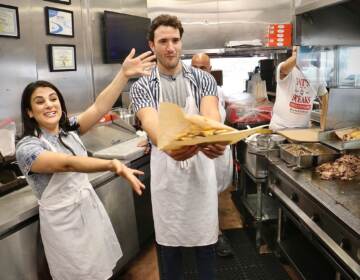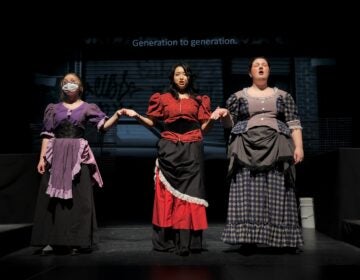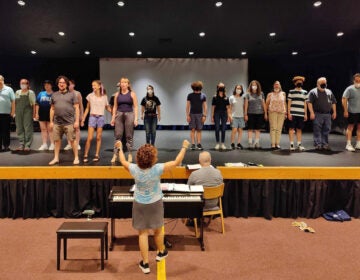What’s a Zep? Norristown explained, on stage
Theatre Horizon interviewed 130 residents of Norristown, Pa., to inform its original play that will be performed by a cast of 60 townspeople.
Listen 4:04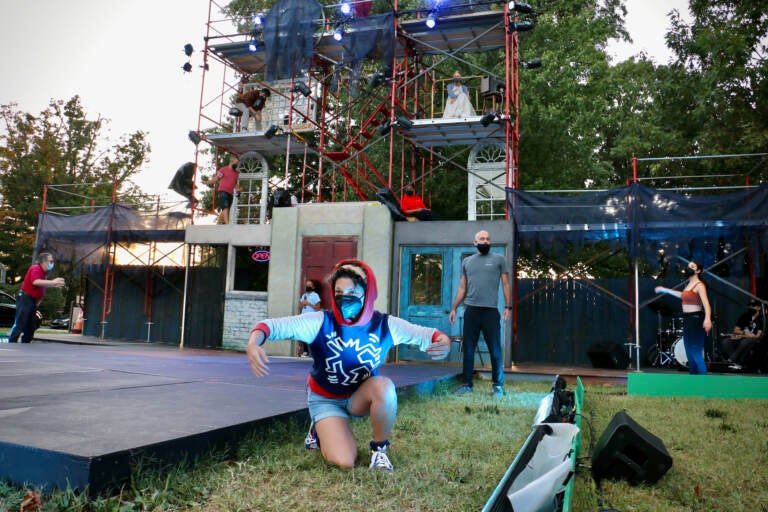
The Chorus of the Dead perform during a rehearsal of ''TOWN,'' a play created and performed by Norristown residents. (Emma Lee/WHYY)
Got a question about life in Philly’s suburbs? Our suburban reporters want to hear from you! Ask us a question or send an idea for a story you think we should cover.
Last week Cathy Nyagwegwe, 70, was waiting for her entrance during a rehearsal of “TOWN,” a new play about Norristown, Pa., by Theatre Horizon. She has never before performed onstage.
“I’m a little nervous and shaky, but I received a lot of help and I’m trying hard to learn my part,” she said.
Nyagwegwe is part of TOWN’s enormous cast of about 60 performers, a vast majority of which are amateur, all of whom reside in Norristown.
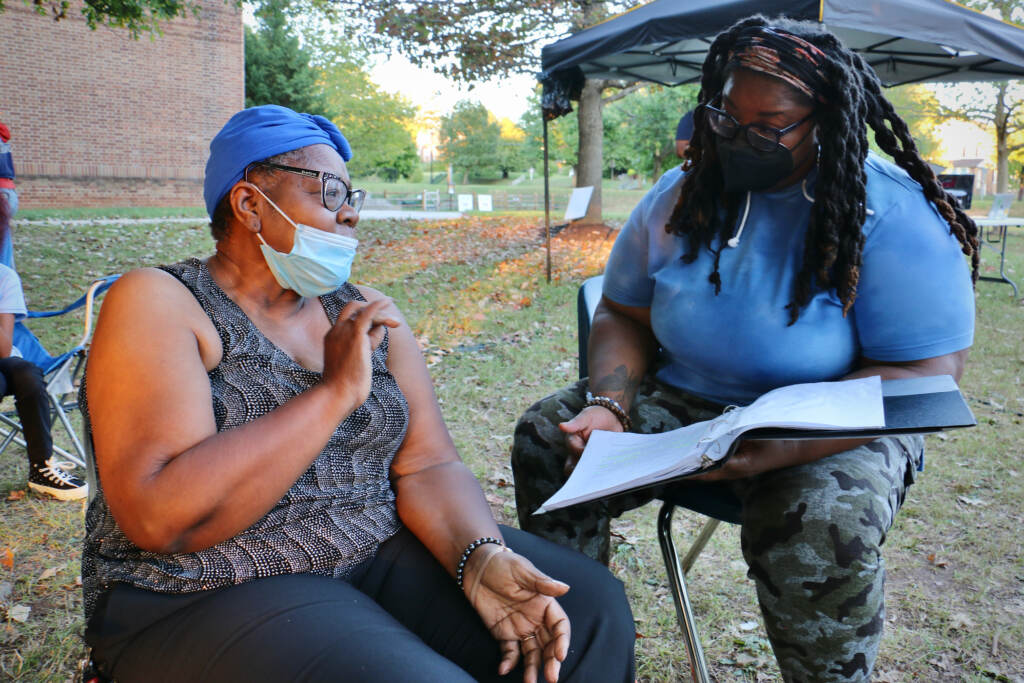
She plays a character with no name, called Musician, based on the story of John Francis Stephens, a fixture of Norristown. Nyagwegwe knows him personally from the senior center.
Like most everybody else in town who knows Stephens, Nyagwegwe calls him Skippy.
“He plays the harmonica. He plays the organ. He sings. He brings a lot of joy to us at the center,” she said. “I’m giving the story of the Musician and some of the people he knew from way back in this neighborhood. So many of those people have passed away. He’s shedding the light on who they used to be.”
“TOWN” will be performed outdoors, for free, on the front lawn of Eisenhower Science and Technology Leadership Academy this weekend. The music collective ILL DOOTS performs an original live soundtrack.
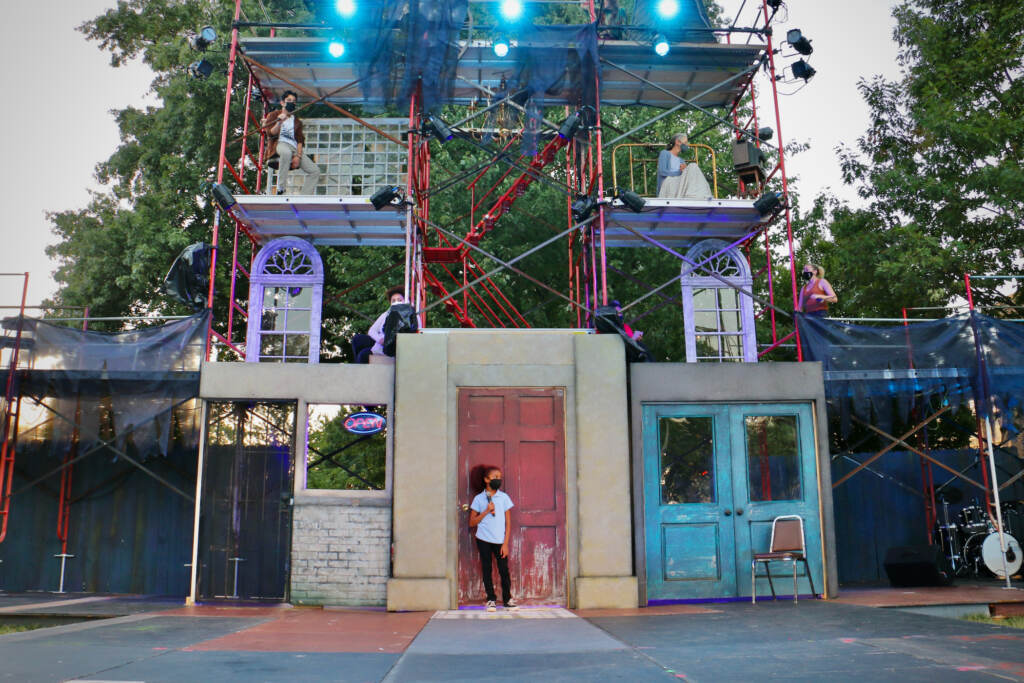
Playwright Michael John Garcés based his script on over 130 interviews conducted with residents of Norristown, combining their stories into a script with a generous dollop of creative license.
“It’s not based on a formal history of Norristown. So you’re not, like, watching a chronological story,” said Mydera Taliah Robinson, a writer, lifelong Norristonian, and Theatre Horizon’s education director. She plays the role of Teacher.
“It brings in the stories and experiences of varied people, ranging many generations and backgrounds,” she said. “It’s very much informed by personal stories.”

If you want to tell the story of Norristown, you need to talk about the Zep.
The second act of Town includes a fictitious group called the Zep Cognoscenti, delivering shout-outs to various Norristown restaurants.
An outsider learns Norristown takes lunch seriously.
“I go to Eve’s. I go to LaRoma’s [Pizza King],” said Nyagwegwe before turning to Robinson. “What about you?
“Definitely Eve’s,” confirmed Robinson.
A reporter had a lot of questions: What’s Eve’s?
“Eve’s Lunch. You have to try the Norristown favorite, which is the Zep,” said Robinson. “Definitely got to shout out Lou’s, another great sandwich shop.”
OK. So, what’s a Zep?
“All right, so hopefully I don’t get in trouble for getting this wrong, but a Zep is a kind of hoagie,” she said. “It’s salami with onion, tomato, hot pepper spread, oregano and oil on a perfect Conshy roll.”
What’s a Conshy roll?
“It comes from Conshohocken. Most of the rolls come from either Conshohocken or Corropolese,” said Robinson, explaining the prominence of local Italian bakeries in nearby Conshohocken and Norristown.
Favorite lunch spots will not be the only things native Norristonians will recognize in this production of “TOWN.”
The set is a three-tiered structure featuring a hodge-podge of local architectural references: the basic structure is shaped like Norristown’s oldest building, the 18th century Selma Mansion; the doorway columns resemble the old Bell Telephone building at 401 DeKalb Street (now the home of Theatre Horizon); a storefront to stage left looks like Jule’s Sweet Shop on Powell Street; a clockface is modeled after the one on the Montgomery County Courthouse downtown at the county seat; and a rooftop cupola comes from Central Behavioral Health, a mental health clinic at DeKalb and Basin streets.
The artistic director of Theatre Horizon, Nell Bang-Jensen, wants to put Norristown onstage in a way that, hopefully, most of the city will recognize.
“Not just the typical audiences who attend theater in Philadelphia in mainstream theaters, who tend to be older, white, upper-middle class,” she said. “If we’re a theater in Norristown, how are we really engaging this wildly diverse community and offering them opportunities to participate, and not just come and sit back and watch?”
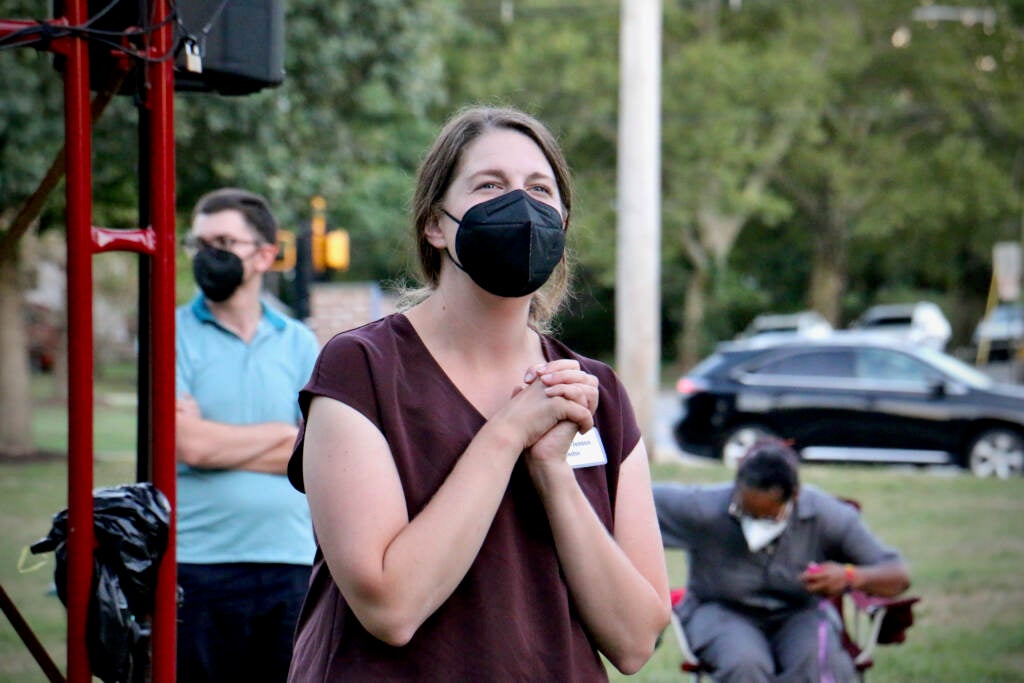
Bang-Jensen has her eye on the demographics of the city, which is about 60% Black and Latino, and about 17% below the poverty line, according to recent U.S. Census data.
That fact that Norristown is inside Montgomery County – which is predominately white (78%), with an average income nearly twice that of Norristown and a poverty rate less than a third — can affect how Norristown is perceived by outsiders.
“There’s a good amount of us who wanted to participate because we wanted to have the right story told for once,” said Robinson. “Norristown is definitely out there. It shows up in the papers and in the news, but it’s not always the true story. Not what the residents would tell you.”
The three acts of the play generally break down into the past, present, and future of Norristown. The cast is a mix of ages, races, and neighborhoods.
“Whose story is it? Who gets to create the future?” said Bang-Jensen. “There’s a very poetic, to me, moment in Act Three where the youths are trying to tell the story of Norristown and they start by doing a play about the past. The seniors turn it back on them and say, ‘No, when we talk about Norristown we want to hear from you.’”
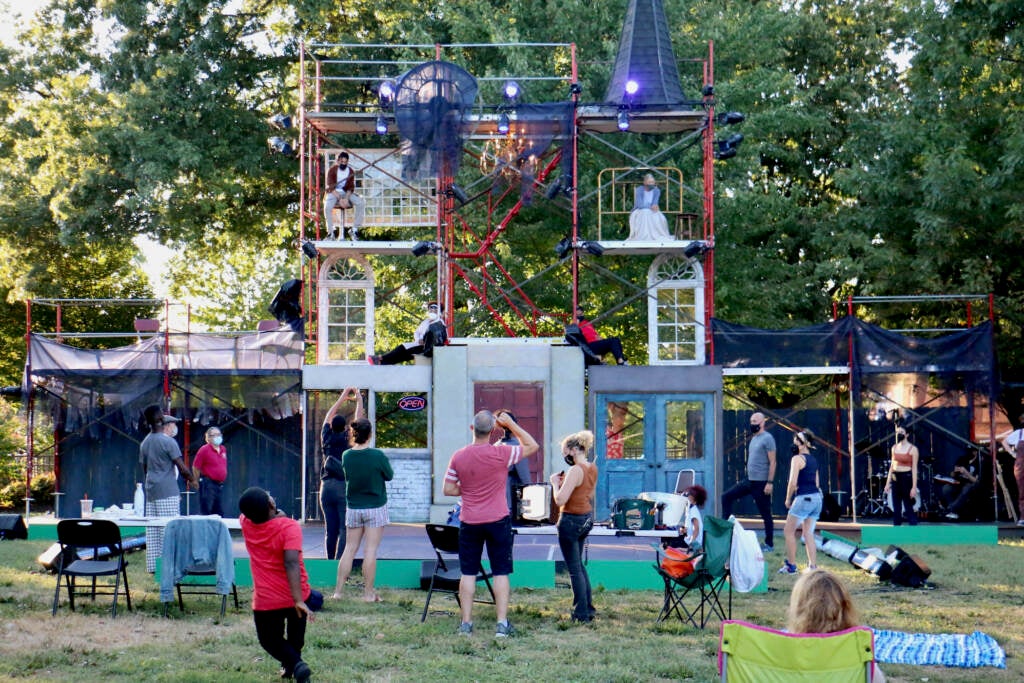
The first act starts with a flood, something Norristown has historically been prone to on the bank of the Schuylkill River. The play almost immediately signals this is not a dry history lesson. From the flood the past literally comes back to life. A Chorus of the Dead commands the stage as a group of ghosts repeat the stories of their lives in a boom-to-bust industrial textile town.
“The element of fiction and theatricality is really important in terms of having people both recognize themselves in the piece, and also seeing Norristown in a completely different way,” said Bang-Jensen. “And having high production value, with the kind of whimsy and fantastical elements that theater can offer.”
“TOWN” is a work of fiction, but with veins of truth running throughout. One of the characters is Parent, played by Karen Siwick whose role does not stray from her own story. Her part in the play is to recite a monologue about her own life as a parent.
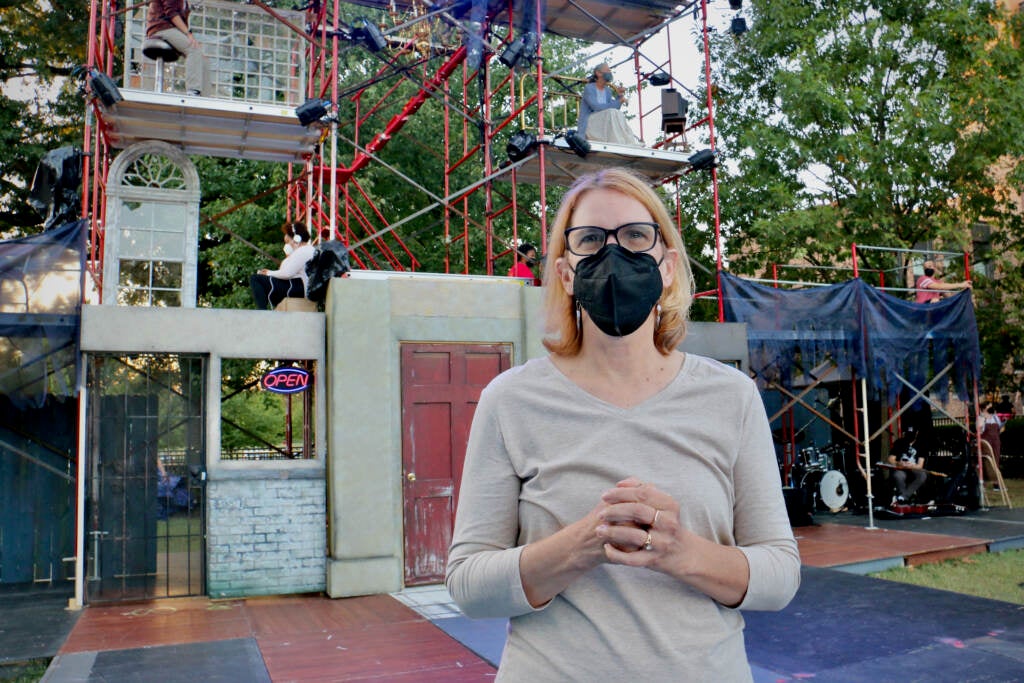
Siwick, 60, has been a resident of Norristown for 34 years and was the parent of a son on the autism spectrum. When it came time to send her son to school, Siwick was surprised to find Norristown School District had special needs programs ready for him.
“This is back in the early 2000s when he went into elementary school,” she said. “Surprisingly, they had an autistic support program, because you would think Norristown would be, like, way behind.”
Siwick’s son was able to take advantage of support programs until he was 21.
Shortly thereafter, in 2017, he suddenly died.
It was the worst time of Siwick’s life, made slightly better by the outpouring of support from Norristown.
“Everyone came to his funeral,” she said. “It was really in the middle of the most awful day in my life, but it made it so much more meaningful because, like I say in the monologue, almost every teacher he had came, bus drivers came, even people from the office staff came from the school district. We were stunned.”
“The fact that those people came is really something I’ll never forget,” said Siwick.
Siwick now works in administration for special needs programs at Agora Cyber Charter School in King of Prussia. She is a longtime patron of Theatre Horizon but has never performed anything, anywhere. She said she would probably not have done “TOWN” if she had to take on another character.
“I couldn’t be the Teacher, or I couldn’t be the Entrepreneur or something like that. It’s easy because I’m telling my story,” she said. “I’m just sort of having a conversation with people. So it’s natural in a sense. I don’t have to pretend to be somebody else.”
“TOWN” runs this weekend only, through Sunday Sept. 18. It is a free, outdoor performance. In the event of rain on two or more nights, an additional performance will be held on Monday, Sept. 19.
WHYY is your source for fact-based, in-depth journalism and information. As a nonprofit organization, we rely on financial support from readers like you. Please give today.




